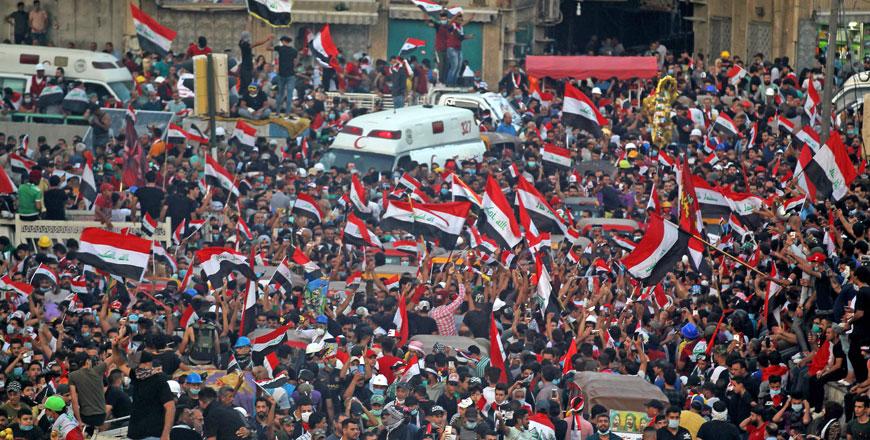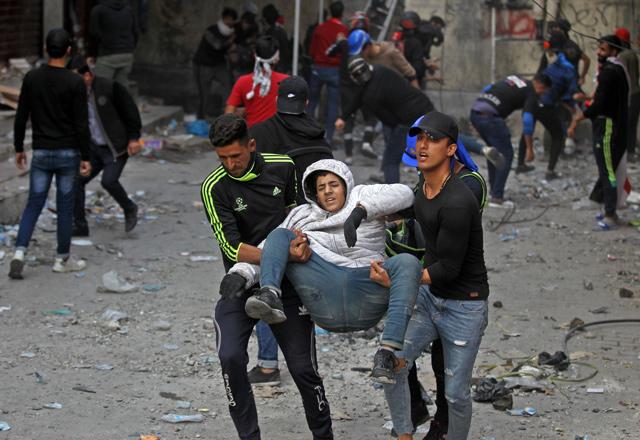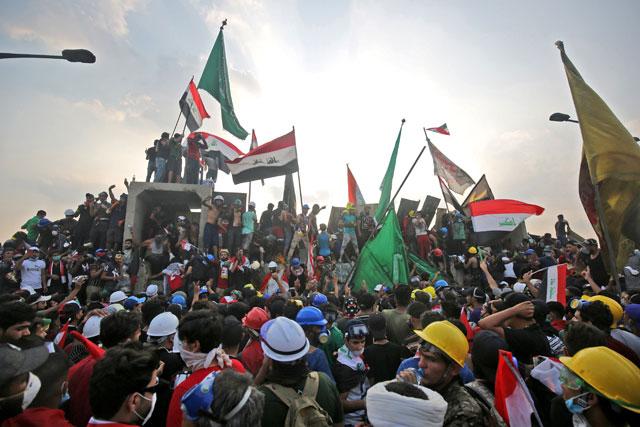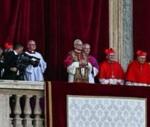You are here
Iraq PM's future on the line as demonstrators smell change
By AFP - Oct 31,2019 - Last updated at Oct 31,2019
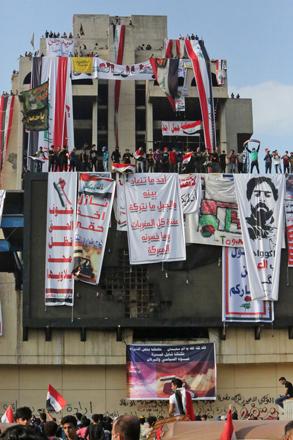
Iraqi protesters gesture as they stand atop a building lined with banners overlooking Tahrir square, during anti-government demonstrations in the capital Baghdad, on Wednesday (AFP photo)
BAGHDAD — The future of Iraq's embattled premier was in the hands of his onetime parliamentary backers Wednesday, as they deliberated over his ouster after mass anti-government protests that have left more than 240 dead.
Massive rallies broke out in Iraq's capital and south this month against corruption and unemployment, spiralling into angry calls for a total government overhaul.
By Wednesday, demonstrators were waiting to see whether the first fruit of their struggle — the ouster of Prime Minister Adel Abdul Mahdi — was finally within reach.
"Isn't it the people who have the power? Isn't it the people who put them all there?" asked protester Athir Malek, 39.
He had come from Diwaniyah, 200 kilometres further south, to join the biggest rallies so far in Baghdad’s Tahrir Square, where celebration was in the air.
They were joined on Wednesday by the United Nations’ top representative in Iraq, Jeanine Hennis-Plasschaert, who called again for a national dialogue to “unite against the perils of division and inaction”.
Parliament has demanded that the premier appear “immediately” for questioning amid speculation he will face a no-confidence vote.
Abdel Mahdi, 77, came to power last year through a tenuous partnership between populist cleric Moqtada Sadr and paramilitary chief Hadi Al Ameri.
No alternative?
The kingmakers’ alliance has since drifted apart and protests widened the rift, with Sadr’s Saeroon bloc, the biggest in parliament, endorsing the demonstrators.
The Hashed Al Shaabi paramilitary force, whose political arm Fateh is parliament’s second-biggest bloc and is chaired by Ameri, has so far backed the government.
Several Hashed offices were torched in southern Iraq last week, further straining ties.
But Sadr extended an invitation to Ameri late Tuesday to coordinate on a no-confidence vote in Abdel Mahdi and using Twitter to urge the premier to “Get out!”
Hours later, Ameri announced he and Sadr would “work together to achieve the people’s demands”, hinting he may agree to a vote on the premier’s future.
Sadr took to Twitter again on Wednesday to pile on pressure, warning that keeping Abdel Mahdi would “turn Iraq into Syria or Yemen”, both engulfed in bloody wars.
Meanwhile, Iran’s supreme leader Ayatollah Ali Khamenei told Iraqis they should find legal ways to resolve crises instead of hitting the streets.
“The people of Iraq and Lebanon have some demands that are rightful, but they should know these demands can only be realised within the legal frameworks,” said Khamenei.
Iraq’s former prime minister Iyad Allawi shot back: “Sowing fear while explaining there’s no alternative... is a false pretext.”
‘Back to square one’
As rumours swirled that Abdel Mahdi’s days were numbered, people rallied in Tahrir for a seventh consecutive day on Wednesday.
Despite violence that has left more than 240 people dead and more than 8,000 wounded, they have defied orders to clear the streets.
The largest numbers yet — tens of thousands — flooded Tahrir overnight amid blaring horns, fireworks and loud Iraqi music.
Demonstrators have shrugged off a litany of government reform plans and called for a new constitution, reworked electoral law and mass resignations from a government they see as corrupt.
“They should all quit and we should have a national salvation government,” said Alaa Khdeir, 63.
While the premier’s departure would be seen as a “victory” for demonstrators, it would “give protests a break but not break them”, said Maria Fantappie, an Iraq analyst at the International Crisis Group.
“Even an election with the same election law would bring same figures into parliament and the same process as last year in selecting the prime minister, which puts you once again at square one,” Fantappie said.
Since the US-led invasion that toppled dictator Saddam Hussein in 2003, Iraq’s political system has been gripped by clientelism, corruption and sectarianism.
The country is ranked by Transparency International as the 12th most corrupt in the world.
That means getting a job in government — by far the country’s biggest employer — is often secured with bribes or connections.
Anger at the state of affairs had been swelling among the youth, who make up 60 per cent of Iraq’s nearly 40 million people.
Youth unemployment stands at 25 per cent, while one in five live below the poverty line, despite the vast oil wealth of OPEC’s second-largest crude producer.
Inequality and corruption have been major rallying cries for protesters.
“We want to take back everything they stole,” said 55-year-old Hussein Nuri.
Related Articles
BAGHDAD — Iraqi President Barham Saleh vowed Thursday to hold early parliamentary elections once a new law is passed and said the country's
NASIRIYAH, Iraq — Iraqis kept up anti-government protests in Baghdad and the south on Saturday, dissatisfied with the premier's vow to quit
NAJAF, Iraq — Populist Iraqi cleric Moqtada Sadr joined thousands of demonstrators in the holy city of Najaf on Tuesday amid a spiralling po


